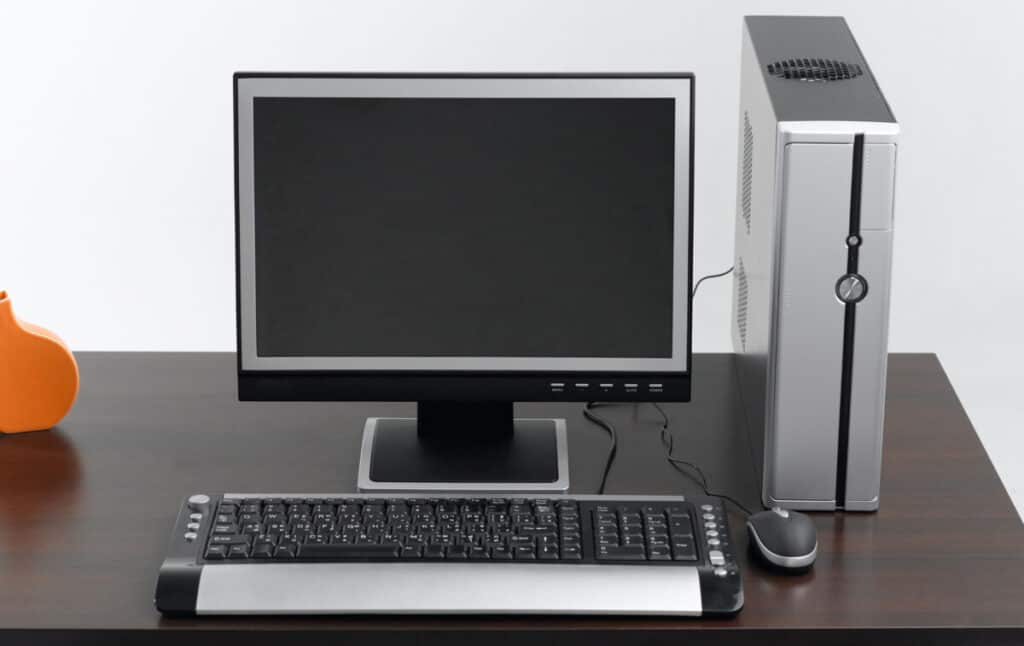
When a computer dies, it’s easy to assume it needs to go in the trash or on the curb to wait for the garbage man. However, computers need more care than that. Incorrectly disposing of a computer can be dangerous.
A computer can be disposed of through donation to a thrift store or computer specialist, upcycling parts, and recycling. Computers should never be thrown in the trash since they contain heavy metals like lead that are dangerous to the environment. Bring it directly to waste disposal.
Disposing of a computer is less complicated than it might sound, but it is a process that needs careful attention to protect both personal data and the environment. Keep reading below for more information on safely disposing of a computer!
How Can You Dispose of Your Old Computer?
Every computer dies eventually, even if we wish it wouldn’t. Years of data, hard-earned money, and decades of technological development turn into a complicated brick that needs to be disposed of. No matter how much you want to, you can’t just dump it on the curb and hope for the best.
Before deciding what to do with your computer, you need to think of safety concerns. Why are you disposing of it? Is it broken? Is it just old? Have you recovered any data you need from it? Think over it carefully, and consider getting professional help if you don’t know how to clear your personal information.
What You Can Do if It’s Broken
If your computer is broken, your first priority is making sure your data is safe. Consulting a tech specialist will help you decide if your computer just needs a little love and maintenance or if it needs all data wiped. Hopefully, you’ll be able to recover your data! If not, you’ll want to make sure nobody else can recover it.
After that, your options are to donate it to somebody who will use the parts or bring it safely to waste disposal. Your tech specialist may even be able to handle that part for you. Many chain stores like Best Buy, Staples, or Samsung offer tech recycling services, and you can search your local area as well.
It is vital that you do not just dump your computer. Different parts of the computer are dangerous for the environment if they break down, and computer parts like laptop batteries can even explode and catch fire if they overheat or get punctured.
What You Can Do if It’s Old
If your computer is just old, you have more options than somebody with a broken computer. However, you also have a greater need to make sure all your data is wiped from the computer before giving it up.
Groups like refugees, youth homes, and charities are always looking for computers to give to those who can’t afford one. A computer that is embarrassingly old to you might be life-changing to them. Even a computer that doesn’t work well can be fixed up by volunteers so it can be donated.
Old computers can also be turned into routers for your home, taken apart for individual parts, or updated for your own use. Let a tech-loving friend or computer specialist try to bring it to the modern day and you might save some money.
If all else fails, you can bring the old computer or remaining parts to the dump. Just make sure you bring them to the appropriate place for disposal. Nobody wants an exploding laptop battery to catch a landfill on fire.
First, Wipe Your Data
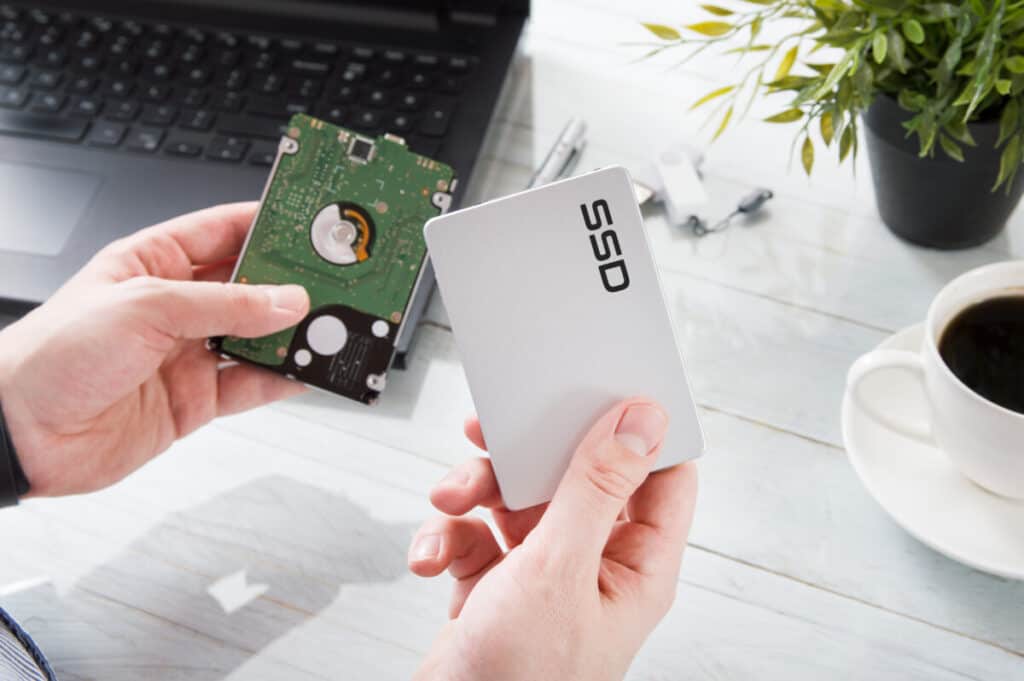
This is the single most important thing you can do when disposing of an old computer. Your files, passwords, credit cards, accounts, and even your identity are at risk if you dispose of a computer without thoroughly clearing it of data first. Additionally, any files you want to keep but haven’t uploaded to a different source will be lost forever when the computer is wiped.
Don’t risk losing all your family photos. Make sure you follow the safety steps carefully.
Upload Any File You Want to Keep
Many sources for uploading files exist. If you know what you’re doing, you can even use your old hard drive as an external hard drive on your new computer!
You’ll need to go through every file on your computer and make sure you’ve uploaded it. Every file that isn’t moved to an external hard drive, One Drive, or a Cloud service will be lost. You do have options to choose from.
- Google Drive is free and online, so it can be used on any computer or phone. Some documents might reformat.
- iCloud comes with Apple and charges $0.99 for additional storage
- Evernote
- Dropbox
- OneDrive
Storing files like powerpoints on flash drives works to a point, but they are easily lost. Use caution when looking for other options.
Once the file is uploaded, delete it from your computer. You’ll still want to wipe it afterward to be extra sure that it is gone.
Log Out of Everything
The next step in wiping your computer is logging out of everything. You’ll need to go through your browser and log out of every site, along with wiping your browser history in case it saved any passwords. Next, you’ll need to go through your computer and un-pair it from Bluetooth devices, un-pair it from speakers or external drives, and log out of downloaded apps like Steam, Microsoft Office, One Drive, and Chrome.
Don’t forget that you also need to de-authorize your computer! Programs like iTunes only allow a set number of devices, and you need to remove your computer from the list before deleting files.
Wipe Everything Else
Finally, you need to wipe all data and personal information from your computer.
To do this, you need to factory reset the computer. This will look different depending on your operating system and type of computer, but it is usually an option in the settings.
The hard drive is the last security concern you have. You can turn this into an external hard drive, wipe it completely, or you can take it apart for magnets before smashing it with a hammer. Either way, you should rarely donate an old hard drive.
What Do I Do if I Can’t Access My Files?
If your computer is broken at the start of this cycle, there are a few things you can do.
Hopefully, you’ve been using a cloud service already. That would mean most of your files are safely stored on OneDrive or another service, and not totally lost on a dead computer. If they weren’t on there, you should take your computer to a data recovery professional.
The data recovery professionals will do what they can to restore your files. Once they’re done, you can ask them to dispose of your computer and destroy the hard drive. If they couldn’t access any files, breaking down the computer and destroying what’s left of the hard drive will make it difficult for anyone else to access your personal information later on.
Repairing, Repurposing, or Donating Your Old Computer
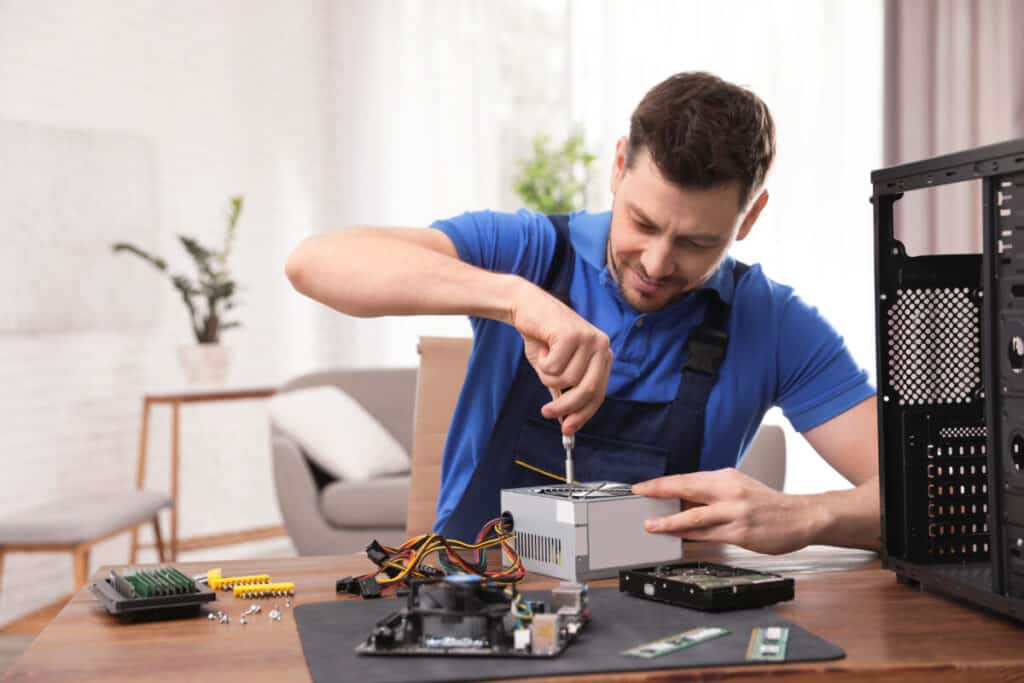
While you might think that your fifteen-year-old computer can’t go anywhere but a landfill, you’d be surprised how many tech people would disagree. Computers are full of valuable parts that can be reused for new machines. Your computer could have a whole new life helping someone else!
Donating
If your computer still works, you can donate it directly to a thrift store or other service. Even an old computer would be a valuable gift for someone who can’t afford a new one. Students in your neighborhood would love to use an old computer to practice repair skills and programming on a computer that they can afford to break, and the computer can be reused again when they’re done.
Many charitable organizations or individuals will repair and donate computers. For example, a young university student repaired and donated computers for refugee children to use during online school. He took donations of old computers from around the city and was able to provide computers for several families at no cost.
The saying “one man’s trash is another man’s treasure” becomes literal with technology!
Repairing
You might be surprised by what can be repaired on a computer. If you’re disposing of your computer because it’s no longer working well, or even if it won’t turn on, you can try taking it to a repair shop first! Many of them offer a free consultation, and they’ll tell you if it’s worth your time to repair your computer or if you should dispose of it.
Many people are surprised to find that all they needed was a thorough update. Updates can be easy to miss if you’re not familiar with computers, and operating systems become slow and tired if they’re not updated regularly. A professional consultation should catch this and get your computer back up to speed, but you can also check for yourself.
Once it’s repaired, you can either continue using it or sell it to help pay for a new computer. A $50 repair can save you a $500+ purchase, and that’s a big deal for most people.
Repurposing
If your computer isn’t working well as a computer anymore, you may be able to repurpose it into something like a home router that connects all your devices. Check with a friend who works with computers to see if they can help you set it up!
Another alternative is using an old computer and monitor as an emergency backup for when you just need another screen that connects to the internet. A computer that can no longer handle word processing or downloading files could still be able to run a single tab with a video streaming service, YouTube, or a textbook for your student’s homework.
There is no shame in using a computer until it’s completely worn out. If these ideas appeal to you, give them a shot. You can always donate them or recycle them if it doesn’t work out.
Upcycling Parts of Your Computer
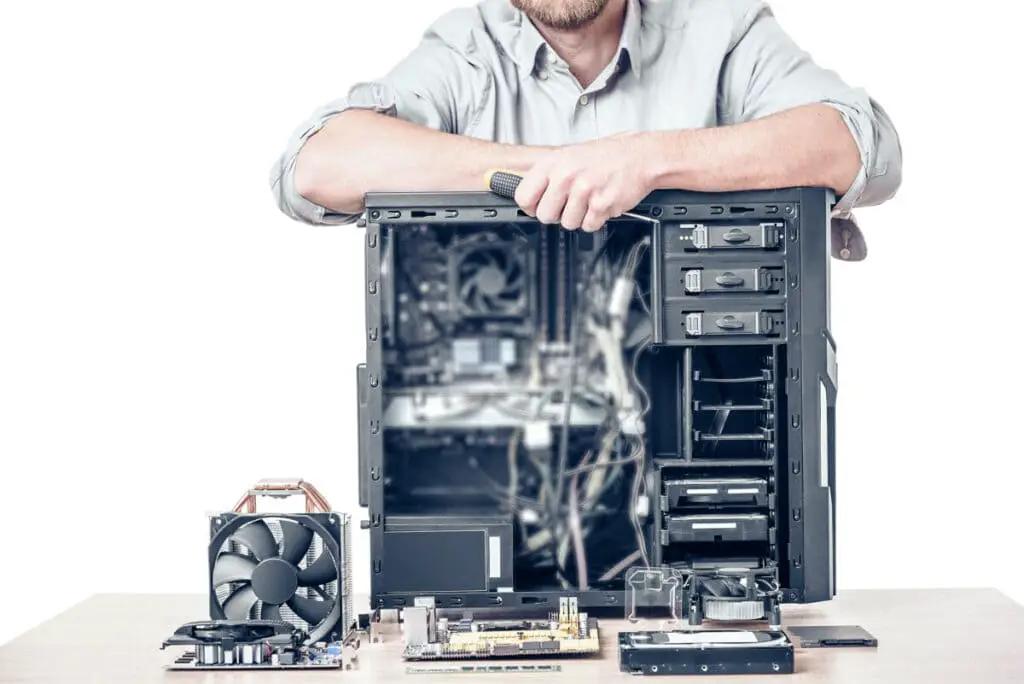
“Upcycling computer parts” is a nice way to say that somebody is taking the whole thing apart and keeping the good pieces. Computer parts are expensive, and often difficult to find, so tech people love getting their hands on old machines that can be broken down.
Parts of the computer that are especially valuable to people collecting parts include:
- The Graphics Card/GPU
- The Central Processing Unit/CPU on newer computers
- The case/main body of the computer, if it’s in good repair
- The fans
- Hard Drives/SSDs, but use extreme caution to protect privacy
- Motherboards on newer computers
- Entire laptops
Hard drives are a tricky topic when it comes to upcycling computers. While they often need to be destroyed to protect sensitive data and personal privacy, a functioning hard drive is a valuable find for someone rebuilding a computer to donate. If your hard drive didn’t store sensitive data or documents, and if it passes the cleaning test of a trusted computer professional, it can be donated to someone who is rebuilding computers for charity.
In the words of one computer programmer, “if it isn’t smoking, it can be reused.”
Every reused computer part is one more thing that stays out of landfills, as well as one more thing that doesn’t need to be produced. Upcycling is good for wallets and the environment.
Leftover parts that are too damaged to be used should be recycled or disposed of safely. Remember, laptop batteries can explode and some computer parts are toxic heavy metals.
Recycling Your Computer
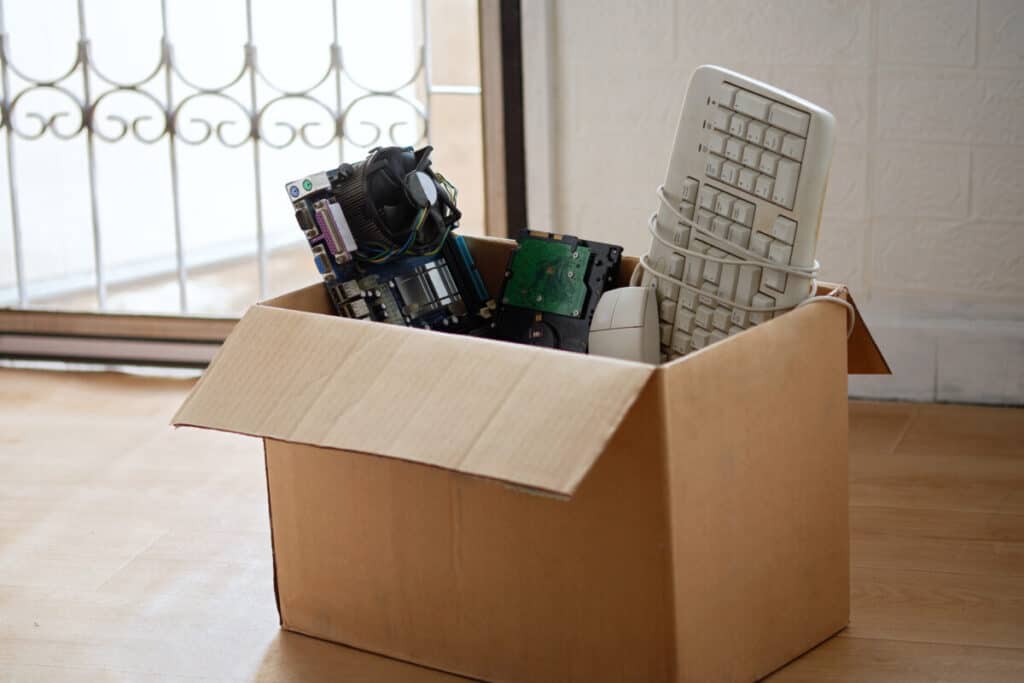
Recycling your computer should always be the last stop in its life cycle, if at all possible. Recycling centers know how to safely dispose of environmental hazards within the computer, can collect precious materials like gold, and can recycle other components in a more traditional way. Computers should never be thrown in the trash or left on the curb.
Many tech stores are able to recycle the computer for you. Other companies that you may have bought the computer from are also able to receive the computer and recycle it. Earth911 has resources available to help you find a recycling center or store near you that accepts computers, as well as resources to help you find out if local curbside pickup for tech is available.
As long as you’re making the trip, you can see if you have other things to recycle. Phones, TVs, and another tech can often be recycled at the same location. You can clear out your home and help the environment in one car ride.
Related Topics:
If you like the article above, here are some other similar articles you should check out!
